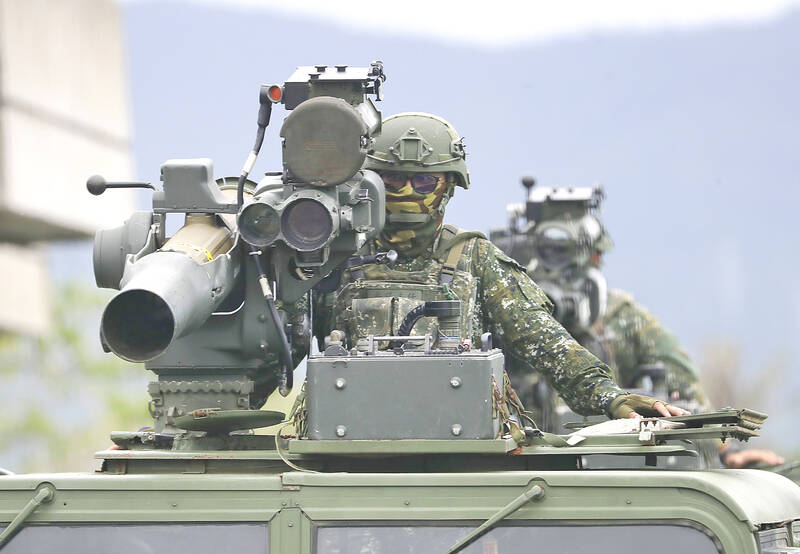The National Defense Act (國防法) should be amended to require technology transfers to Taiwan in cases of international cooperation on weapons research and development, Democratic Progressive Party (DPP) lawmakers said.
President William Lai (賴清德) recently announced that he would raise the defense budget to more than 3 percent of GDP by allocating a special budget for it, given the growing threat from China.
DPP legislators Chiu Chih-wei (邱志偉) and Lin Chun-hsien (林俊憲) on Sunday said that part of the budget would go toward increased arms procurements from the US, but Taiwan should also seek to develop its own arms industry through an amendment to Article 22 of the National Defense Act.

Photo: Chiang Ying-ying, AP
The article states: “When it is necessary to pursue outsourcing channels, the acquisition activities shall realize technology transfer policy so as to establish an autonomous national defense infrastructure.”
Under Chiu and Lun’s proposed amendment, the article would stipulate that a technology transfer should also be implemented when “conducting international cooperation in the research and development, production, or maintenance of related weapons and equipment in order to achieve national defense independence and safeguard Taiwan’s security goals.”
The US supports Taiwan’s acquisition of defense equipment through multiple channels, including independent research and development, and technology transfers, to connect with the international supply chain, Chiu said.
“Taiwan faces challenges caused by the delayed delivery of US arms,” he said. “To strengthen Taiwan’s national defense and self-defense capabilities, it is crucial to actively promote the Taiwan-US joint weapons production plan.”
Taiwan should strive to obtain original manufacturer certification and promote the development of its domestic industry through international cooperation and investment, Chiu said.
To facilitate that, articles 10 and 19 of the Defense Industry Development Act (國防產業發展條例) should be amended, he said.
Current provisions limit cooperation with foreign suppliers on the research, production, manufacture and maintenance of military defense supplies, except in the case of a “special necessity,” with the approval of a competent authority in consultation with other authorities in charge, Chiu said.
In some cases, the involvement of other ministries or agencies might be required to procure foreign materials or supplies. For example, in the sourcing of key components and raw materials for drones, the Ministry of Transportation and Communications might be involved, he said.
However, the ministry would be outside of the scope of authorities defined under the current regulations, so the draft article amends that by including “relevant agencies,” he said.
“Implementing the transfer of key technologies associated with research and development or production and expanding the defense industry market would contribute to the country’s long-term security and development,” he said. “Many countries adopt flexible and diversified supply strategies to avoid monopolizations of the sources of key military components and raw materials.”

Taiwan is stepping up plans to create self-sufficient supply chains for combat drones and increase foreign orders from the US to counter China’s numerical superiority, a defense official said on Saturday. Commenting on condition of anonymity, the official said the nation’s armed forces are in agreement with US Admiral Samuel Paparo’s assessment that Taiwan’s military must be prepared to turn the nation’s waters into a “hellscape” for the Chinese People’s Liberation Army (PLA). Paparo, the commander of the US Indo-Pacific Command, reiterated the concept during a Congressional hearing in Washington on Wednesday. He first coined the term in a security conference last

Prosecutors today declined to say who was questioned regarding alleged forgery on petitions to recall Democratic Progressive Party (DPP) legislators, after Chinese-language media earlier reported that members of the Chinese Nationalist Party (KMT) Youth League were brought in for questioning. The Ministry of Justice Investigation Bureau confirmed that two people had been questioned, but did not disclose any further information about the ongoing investigation. KMT Youth League members Lee Hsiao-liang (李孝亮) and Liu Szu-yin (劉思吟) — who are leading the effort to recall DPP caucus chief executive Rosalia Wu (吳思瑤) and Legislator Wu Pei-yi (吳沛憶) — both posted on Facebook saying: “I

The Ministry of Economic Affairs has fined Taobao NT$1.2 million (US$36,912) for advertisements that exceed its approved business scope, requiring the Chinese e-commerce platform to make corrections in the first half of this year or its license may be revoked. Lawmakers have called for stricter enforcement of Chinese e-commerce platforms and measures to prevent China from laundering its goods through Taiwan in response to US President Donald Trump’s heavy tariffs on China. The Legislative Yuan’s Finance Committee met today to discuss policies to prevent China from dumping goods in Taiwan, inviting government agencies to report. Democratic Progressive Party Legislator Kuo Kuo-wen (郭國文) said

The Ministry of Economic Affairs has fined Taobao NT$1.2 million (US$36,900) for advertisements that exceeded its approved business scope and ordered the Chinese e-commerce platform to make corrections in the first half of this year or its license would be revoked. Lawmakers have called for stricter supervision of Chinese e-commerce platforms and more stringent measures to prevent China from laundering its goods through Taiwan as US President Donald Trump’s administration cracks down on origin laundering. The legislature’s Finance Committee yesterday met to discuss policies to prevent China from dumping goods in Taiwan, inviting government agencies to report on the matter. Democratic Progressive Party